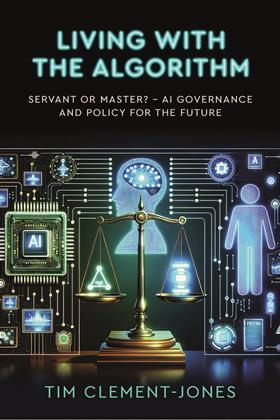Living with the Algorithm: Servant or Master? AI Governance and Policy for the Future
Tim Clement-Jones
£14.99, Unicorn
★★★★✩
This book, published earlier this year, has become more relevant since the EU AI Act came into force, and the new Labour government was elected.
Why? Because while relating the relentless advances in artificial intelligence in recent years, and its rapid infiltration into government, business and society, Tim Clement-Jones sets out in detail the dilemma of balancing innovation and regulation.
Prime minister Sir Keir Starmer referred to this conundrum in his speech at the international investment summit in October. This was followed by the launch of the Regulatory Innovation Office to help innovation cross the ‘regulatory minefield’, and a new AI safety platform to help businesses assess and mitigate AI risks.
The problem, as Clement-Jones, reiterates throughout, is that while AI supports productivity, efficiency and innovation, it is becoming more prevalent, more intrusive and more of a threat to human safety, society, and individual rights and freedoms. Clement-Jones dedicates chapters to dangerous use cases like automated weapons systems and systems that undermine society, for example by interfering with elections. These new threats clearly need to be controlled (as the EU AI Act attempts to do), while somehow making sure that regulation does not hold back progressive innovation, such as quickly developing vaccines for Covid-19 and potentially finding solutions to global health and welfare problems.

AI threatens our freedom as consumers and citizens when surveillance systems with face recognition track our movements and social media, and behavioural advertising nudges us into making choices that we may not otherwise have made.
We also risk being disadvantaged by AI systems that automatically decide against our interests – on access to public services, benefits or financial or even healthcare – because their algorithm has been trained on legacy data that is skewed against particular profiles, or recruitment software that has an unconscious bias for or against certain types of candidate. Police and enforcement systems have already been found to be biased against certain ethnicities or locations. And then there is explainability – exemplified in Ofsted’s disastrous attempt to predict A-level grades when the exams were cancelled during the pandemic.
Clement-Jones is a lawyer and a politician who has been involved in AI policy for many years, as chair of the House of Lords Select Committee on Artificial Intelligence, and co-founder and co-chair of the All-Party Political Group on Artificial Intelligence.
Even from his knowledgeable perspective, it is still difficult to create a policy for the future about a technology that is evolving very rapidly. Having made detailed assessments of the risks and benefits surrounding AI at the time of publication, he proposes a governance framework designed to foster both transparency and trust. This would also shape AI development and utilisation to protect societal rights and values and prepare for the ‘unknown unknowns’.
This is not an easy read because of the topic. It is also written in an academic style, including 42 pages of references. But because it covers the dichotomies of AI regulation, it deserves a place on the bookshelves of innovators and policymakers alike.
Joanna Goodman is a freelance journalist































No comments yet